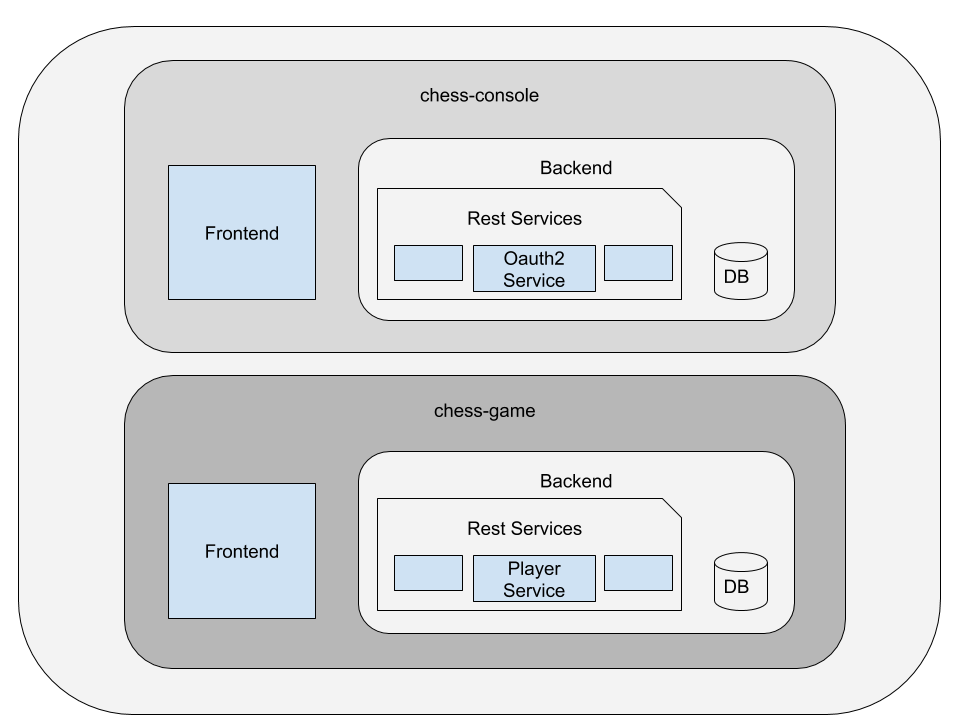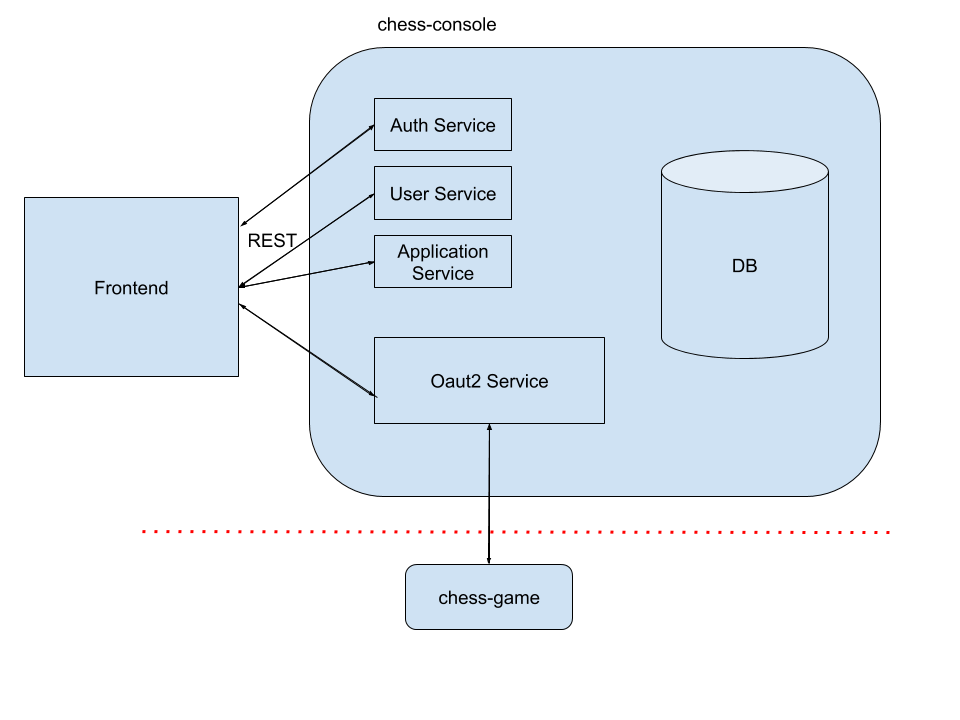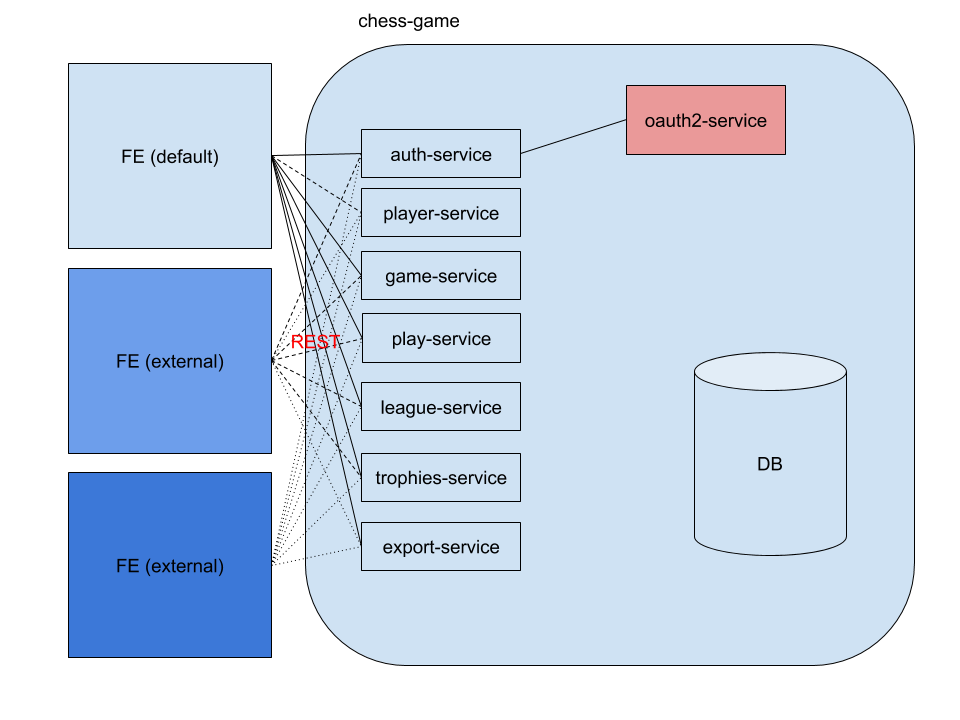Table of Contents generated with DocToc
This application is a distributed chess game server design. The application supports to create players, leagues and trophies. And also the player can play chess games and the games can be saved, paused and resumed.
The application has 2 different main applications. The applications are chess-console and chess-game.
-
chess-console: The chess-console is responsible for the authorization and the authentication part of the application. Basically, the console allows to create a development client with client Id/secret and to manage the grands of the client. It has a backend and a frontend parts. The backend feeds a
oauth2server for thechess-game. And also it has all necessary resources to manage/configure the authentication/authorization of the application. -
chess-game: The chess-game is the main of the game. It has a backend and frontend applications. The backend is designed as microservices. And all microservices has secure oauth2 APIs. The frontend is the default oauth2 client of the application.
- JDK1.8
- gradle
- docker
- docker-compose
- Spring Boot
- Spring Microservices
- Oauth2
- Hibernate/JPA
- Redis
- Postgresql
- Lombok
- Flyway
- Swagger
- pojo-tester
- pdfbox
chess-console is a management application for oauth2 clients. A new developer can create a user and the user can create a clients with clientId and clientSecret.
The clients are authorized for chess-game APIs. A developer can create a new frontend (web/mobile) application by using a client.
The chess-console app designed as Spring Microservices application.
All services has their own HTTPS REST services.
-
auth-service: auth-service is an authentication and authorization service for
chess-consoleuser. A registered user is able to create a client. A user can register/login tochess-consoleand start to manage clients. -
client-service: API to create new clients with clientId and clientSecret. The microservice also allows to manage spoces and authorized users for the client. Client service has token based protection.
-
oauth2-service:
oauth2-serviceis the authentication and authorization forchess-game.client-serviceand new registrations tochess-gamefeed theoauth2-service.
swagger is used for API documentation. The swagger UIs for auth-service and client-service are private; for oauth2-service is public.
The database is postgresql. A relational database is more secure for data consistency.
This database contains console_user, console_user_role, the tables for oauth2 (user_info, scope, applications, application_scope, application_user).
Flyway executes all scripts to create or migrate table/table data.
All database models has hibernate/JPA descriptions.
The chess-console has 2 roles.
- CONSOLE_ADMIN: the administrator user of the application.
- CONSOLE_USER: the client owner. A client owner can create many clients.
chess-game is an application for multiplayer chess game service with league, trophies. Admins can create league and trophies. Players can register/login to system and join a league and win trophies.
chess-game has 2 roles.
- admin: user who can authorized to create resources (league, trophies, game)
- player: user who can join a league, play game and win trophies
External front-ends can access the game resources if they have a clientId and clientSecret. External FEs authenticate users over oauth2-service and have a valid access token.
With the valid access token, they can access chess-game APIs. All APIs have their own documentation. External FEs can integrate to chess-game API according to specifications in the documents.
- auth-service: manages login/register of users
- player-service: list services for player with/without trophies
- game-service: save/pause/resume game
- play-service: manages movement in a game. Decides the movement available or no. And decides to winner.
- league-service: create/update/delete services for leagues. create/update/delete is an ADMIN authorization. All users can retrieve all leagues.
- trophies-service: create/update/delete services for trophies. create/update/delete is an ADMIN authorization. All users can retrieve all trophies.
- export-service: the service for exporting data as PDF in the system. The export data can be a league schedule/score table table, game result and details, player ratings.
pdfboxis used to create pdf files.
swagger is used for API documentation. The swagger UIs for auth-service is private; for the other service is public. The swagger definitions must contains authentications and authorizations.
The database is postgresql. A relational database is more secure for data consistency.
Flyway executes all scripts to create or migrate table/table data.
All database models has hibernate/JPA descriptions.
chess-game needs caching some data to speed up. The data especially, user data which is coming in access_token. The APIs need to validate the users and services need to know who owner is.
Normally, the data is in database. But going to database to have user data for all request, brings extra load to the system. In distributed systems the cache must be external.
Redis is used in this application
The chess-console has 2 roles.
- ADMIN: the administrator user of the game application. Admins can list all resources but can delete or update just their own resources.
- PLAYER: the player. Players can join a league, win trophies and play game.
All microservices has their own Dockerfiles. The docker files contains all configurations to run the app and integrate the app with the other microservices.
docker-compose builds all docker images and run the docker containers with necessary scaling.
to build:
docker-compose build
to run:
docker-compose up -d
to scale:
docker-compose scale server=3
to stop:
docker-compose down
gradle clean build
pojo-tester is used to automate model/dto tests. All related tests under domain package.
testImplementation 'pl.pojo:pojo-tester:0.7.6'
There is an experimental code. To test the experimental code, import the postman file


